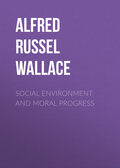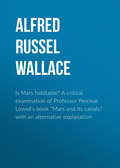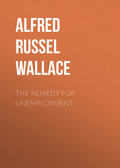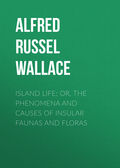
Alfred Russel Wallace
Travels on the Amazon
When the day came, the man was in a great fright, for he did not expect to escape; his wife, however, hit upon a plan, which they resolved to try. They had an old Negro man in the house, who used to be generally employed in the kitchen. They made him exchange clothes with his master, and sent him away out of the house; the master then blacked his face, and made himself as much like the old nigger as he could. On the evening appointed Death came. 'Good-evening, Compadre,' said he; 'where is my compadre?—I'm obliged to take him with me.' 'Oh! Compadre,' said she, 'he didn't at all expect you, and is gone on some business into the village, and won't be back till late.' 'Now I'm in a pretty mess,' said Death; 'I did not expect my compadre would have treated me so; it's very ungentlemanly of him to get me into this scrape after all I've done for him. However, I must take somebody;—who is there in the house?' 'The woman was rather alarmed at this question, for she expected he would immediately have started off to the village in search of her husband: however, she considered it best to be civil, so replied, 'There's only our old nigger, that's in the kitchen, getting supper ready. Sit down, Compadre, and take a bit, and then perhaps my husband will be in; I'm very sorry he should give you so much trouble.' 'No, I can't stay,' said Death; 'I've got a long way to go, and must take somebody, so let's see if the old nigger will do?' and he walked into the kitchen, where the man was pretending to be busily engaged over the fire. 'Well, if Compadre won't come, I suppose I must take the old nigger,' said Death; and before the wife could speak a word, he stretched out his hand, and down fell her husband a corpse."
"So you see," said the old woman to me, "when a man's time is come he must go: neither doctors nor anything else can stop him, and you can't cheat Death nohow." To which sentiment I did not think it worth while to make any objection.
About two days before had been St. John's day, when it is the custom to make bonfires and jump over and through them, which act is considered by the common people as an important religious ceremony. As we were talking about it, the old lady gravely asked if we knew that animals also passed through the fire? We replied that we were not aware of the fact; upon which she informed us that we might hereafter believe it, for that she had had ocular demonstration of it. "It was last year," said she, "on the day after St. John's, my son went out to hunt, and brought home a cotía and a pacá, and both of them were completely scorched all along the belly: they had evidently passed through the fire the night before." "But where do they get the fire from?" I asked. "Oh! God prepares it for them," said she; and on my hinting that fires were not often found in the forest unless lit by human hands, she at once silenced my objections by triumphantly asking me, "if anything was impossible with God?" at the same time observing that perhaps I was a Protestant, and did not believe in God or the Virgin. So I was obliged to give up the point; and though I assured her that Protestants did generally believe in God and went to church, she replied that she did not know, but had always heard to the contrary.
At length, on the 2nd of July, we reached Pará, where I was kindly received by my friend Mr. C, and was glad to learn that there was a vessel in port that would probably sail for London in about a week. Several times on the voyage down I had had fits of ague, and was still very weak and quite unable to make any exertion. The yellow fever, which the year before had cut off thousands of the inhabitants, still attacked new-comers, and scarcely a ship was in port but had a considerable portion of her crew in the hospital. The weather was beautiful; the summer or dry season was just commencing, vegetation was luxuriantly verdant, and the bright sky and clear fresh atmosphere seemed as if they could not harbour the fatal miasma which had crowded the cemetery with funeral crosses, and made every dwelling in the city a house of mourning. Once or twice I attempted to walk out into the forest, but the exertion generally brought on shiverings and sickness, so I thought it best to remain as quiet as possible till the time of my departure.
Since I had left the city it had been much improved. Avenues of almond and other trees had been formed along the road to Nazaré and round the Largo de Palacio; new roads and drives had been made, and some new buildings erected: in other respects the city was the same. The dirty, straggling, uncovered market, the carts of hacked beef, the loud chanting of the Negro porters, and the good-humoured smiling faces of the Indian and Negro girls selling their fruits and "doces," greeted me as of old. Fowls had risen in price from about 2s. to 3s. 6d., and fruits and vegetables in about the same proportion; while in changing English money for Brazilian I now got about ten per cent. less than I used, and yet everybody complained of trade being very bad, and prices quite unremunerative. I heard many stories of miraculous cures of the yellow fever, when at its worst stage, and after the parties had been given up by the doctors. One had been cured by eating ices, another by drinking a bottle of wine; ices, in fact, had got into great favour as a fine tonic, and were taken daily by many persons as a most useful medicine.
I agreed for my passage in the brig Helen, two hundred and thirty-five tons, Captain John Turner, whose property she was; and on the morning of Monday, the 12th of July, we got aboard, and bade adieu to the white houses and waving palm-trees of Pará. Our cargo consisted of about a hundred and twenty tons of india-rubber, and a quantity of cocoa, arnotto, piassaba, and balsam of capivi. About two days after we left I had a slight attack of fever, and almost thought that I was still doomed to be cut off by the dread disease which had sent my brother and so many of my countrymen to graves upon a foreign shore. A little calomel and opening medicines, however, soon set me right again; but as I was very weak, and suffered much from sea-sickness, I spent most of my time in the cabin. For three weeks we had very light winds and fine weather, and on the 6th of August had reached about latitude 30° 30´ north, longitude 52° west.
On that morning, after breakfast, I was reading in the cabin, when the Captain came down and said to me, "I'm afraid the ship's on fire; come and see what you think of it," and proceeded to examine the lazaretto, or small hole under the floor where the provisions are kept, but no signs of fire were visible there. We then went on deck to the forepart of the ship, where we found a dense vapoury smoke issuing from the forecastle. The fore hatchway was immediately opened, and, the smoke issuing there also, the men were set to work clearing out part of the cargo. After throwing out some quantity without any symptom of approaching the seat of the fire, we opened the after hatchway; and here the smoke was much more dense, and in a very short time became so suffocating, that the men could not stay in the hold to throw out more cargo, so they were set to work pouring in water, while others proceeded to the cabin, and now found abundance of smoke issuing from the lazaretto, whence it entered through the joints of the bulkhead which separated it from the hold. Attempts were now made to break this bulkhead down; but the planks were so thick and the smoke so unbearable that it could not be effected, as no man could remain in the lazaretto to make more than a couple of blows. The cabin table was therefore removed, and a hole attempted to be cut in the cabin floor, so as to be able to pour water immediately on the seat of the fire, which appeared to be where the balsam was stowed. This took some time, owing to the suffocating smoke, which also continued to pour in dense volumes out of the hatchway. Seeing that there was now little chance of our being able to extinguish the fire, the Captain thought it prudent to secure our own safety, and called all hands to get out the boats, and such necessaries as we should want, in case of being obliged to take to them. The long-boat was stowed on deck, and of course required some time to get it afloat. The gig was hung on davits on the quarter, and was easily let down. All now were in great activity. Many little necessaries had to be hunted up from their hiding-places. The cook was sent for corks to plug the holes in the bottoms of the boats. Now no one knew where a rudder had been put away; now the thowl-pins were missing. The oars had to be searched for, and spars to serve as masts, with proportionate sails, spare canvas, twine, cordage, tow-ropes, sail-needles, nails and tacks, carpenters' tools, etc. The Captain was looking after his chronometer, sextant, barometer, charts, compasses, and books of navigation; the seamen were getting their clothes into huge canvas bags; all were lugging about pilot-coats, blankets, south-westers, and oilskin coats and trousers; and I went down into the cabin, now suffocatingly hot and full of smoke, to see what was worth saving. I got my watch and a small tin box containing some shirts and a couple of old note-books, with some drawings of plants and animals, and scrambled up with them on deck. Many clothes and a large portfolio of drawings and sketches remained in my berth; but I did not care to venture down again, and in fact felt a kind of apathy about saving anything, that I can now hardly account for. On deck the crew were still busy at the boats; two barrels of bread were got in, a lot of raw pork, some ham and cases of preserved meats, some wine and a large cask of water. The cask had to be lowered into the boat empty, for fear of any accident, and after being securely fixed in its place, filled with buckets from those on board.
The boats, having been so long drying in a tropical sun, were very leaky, and were now half full of water, and books, coats, blankets, shoes, pork, and cheese, in a confused mass were soaking in them. It was necessary to put two men in each, to bale; and everything necessary being now ready, the rest of the crew were called off again to pour water into the hatchways and cabin, from which rose volumes of thick yellow smoke. Now, too, we could hear in the hold the balsam bubbling, like some great boiling caldron, which told of such intense heat, that we knew the flames must soon break out. And so it was, for in less than half an hour the fire burst through the cabin-floor into the berths, and consuming rapidly the dry pine-wood, soon flamed up through the skylight. There was now a scorching heat on the quarter-deck, and we saw that all hope was over, and that we must in a few minutes be driven by the terrible element to take refuge on the scarcely less dangerous one, which heaved and swelled its mighty billows a thousand miles on every side of us. The Captain at length ordered all into the boats, and was himself the last to leave the vessel. I had to get down over the stern by a rope into the boat, rising and falling and swaying about with the swell of the ocean; and, being rather weak, rubbed the skin considerably off my fingers, and tumbled in among the miscellaneous articles already soaking there in the greatest confusion. One sailor was baling with a bucket, and another with a mug; but the water not seeming at all to diminish, but rather the contrary, I set to work helping them, and soon found the salt-water producing a most intense smarting and burning on my scarified fingers.
We now lay astern of the ship, to which we were moored, watching the progress of the fire. The flames very soon caught the shrouds and sails, making a most magnificent conflagration up to the very peak, for the royals were set at the time. Soon after, the fore rigging and sails also burnt, and flames were seen issuing from the fore hatchway, showing how rapidly the fire was spreading through the combustible cargo. The vessel, having now no sails to steady her, rolled heavily, and the masts, no longer supported by the shrouds, bent and creaked, threatening to go overboard every minute. The main-mast went first, breaking off about twenty feet above the deck; but the foremast stood for a long time, exciting our admiration and wonder, at the time it resisted the heavy rolls and lurches of the vessel; at last, being partly burned at the bottom, it went over, more than an hour after its companion. The decks were now a mass of fire, and the bulwarks partly burnt away. Many of the parrots, monkeys, and other animals we had on board, were already burnt or suffocated; but several had retreated to the bowsprit out of reach of the flames, appearing to wonder what was going on, and quite unconscious of the fate that awaited them. We tried to get some of them into the boats, by going as near as we could venture; but they did not seem at all aware of the danger they were in, and would not make any attempt to reach us. As the flames caught the base of the bowsprit, some of them ran back and jumped into the midst of the fire. Only one parrot escaped: he was sitting on a rope hanging from the bowsprit, and this burning above him let him fall into the water, where, after floating a little way, we picked him up.
Night was now coming on. The whole deck was a mass of fire, giving out an intense heat. We determined to stay by the vessel all night, as the light would attract any ship passing within a considerable distance of us. We had eaten nothing since the morning, and had had plenty to do and to think of, to prevent our being hungry; but now, as the evening air began to get cool and pleasant, we all found we had very good appetites, and supped well on biscuits and water.
We then had to make our arrangements for the night. Our mooring ropes had been burnt, and we were thus cast adrift from the ship, and were afraid of getting out of sight of it during the night, and so missing any vessel which might chance to be attracted by its light. A portion of the masts and rigging were floating near the ship, and to this we fastened our boats; but so many half-burnt spars and planks were floating about us, as to render our situation very perilous, for there was a heavy swell, and our boats might have been in an instant stove in by coming in contact with them.
We therefore cast loose again, and kept at a distance of a quarter or half a mile from the ship by rowing when requisite. We were incessantly baling the whole night. Ourselves and everything in the boats were thoroughly drenched, so we got little repose: if for an instant we dozed off into forgetfulness, we soon woke up again to the realities of our position, and to see the red glare which our burning vessel cast over us. It was now a magnificent spectacle, for the decks had completely burnt away, and as it heaved and rolled with the swell of the sea, presented its interior towards us filled with liquid flame,—a fiery furnace tossing restlessly upon the ocean.
At length morning came; the dangers of the night were past, and with hopeful hearts we set up our little masts, and rigged our sails, and, bidding adieu to the still burning wreck of our ship, went gaily bounding along before a light east wind. And then pencils and books were hunted out, and our course and distance to Bermuda calculated; and we found that this, the nearest point of land in the vast waste of waters round us, was at least seven hundred miles away. But still we went on full of hope, for the wind was fair, and we reckoned that, if it did not change, we might make a hundred miles a day, and so in seven days reach the longed-for haven.
As we had supped but scantily the night before, we had now good appetites, and got out our ham and pork, biscuit and wine and water, and made a very hearty meal, finding that even uncooked meat was not to be despised where no fire could be got to cook it with.
The day was fine and warm, and the floating seaweed, called gulf-weed, was pretty abundant. The boats still required almost incessant baling, and though we did not ship many seas, yet there was quite enough spray to keep us constantly wet. At night we got a rope fastened to the long-boat, for her to tow us, in order that we might not get separated; but as we sailed pretty equally, we kept both sails up. We passed a tolerable night under the circumstances. The next day, the 8th, was fine, gulf-weed still floated plentifully by us, and there were numerous flying-fish, some of which fell into our boats, and others flew an immense distance over the waves. I now found my hands and face very much blistered by the sun, and exceedingly sore and painful. At night two boobies, large dusky sea-birds with very long wings, flew about us. During the night I saw several meteors, and in fact could not be in a better position for observing them, than lying on my back in a small boat in the middle of the Atlantic. We also saw a flock of small birds fly by, making a chirping noise; the sailors did not know what they were.
The 9th was again fine and hot, and my blistered hands were very painful. No ship appeared in sight, though we were crossing the track of the West India vessels. It was rather squally, and I passed a nervous, uncomfortable night; our boats did not, however, now leak so much, which was a great satisfaction.
The 10th was squally, and the wind veered to the south-west, so that we could not make our course for Bermuda, but were obliged to go to the north of it. The sea ran very high, and sudden gusts of wind would frequently heel us over in a manner very alarming to me. We had some heavy showers of rain, and should have liked to have caught some fresh water, but could not, as all our clothes and the sails were saturated with salt. Our position at noon was in latitude 31° 59´ north, longitude 57° 22´ west.
The 11th was still rough and squally. There was less gulf-weed now. The wind got still more to the westward, so that we were obliged to go nearly north. Our boats had now got swollen with the water, and leaked very little. This night I saw some more falling stars.
On the 12th the wind still kept foul, and we were getting quite out of the track of ships, and appeared to have but little chance of reaching Bermuda. The long-boat passed over some green water to-day, a sign of there being soundings, probably some rock at a moderate depth. Many dolphins swam about the boats; their colours when seen in the water are superb, the most gorgeous metallic hues of green, blue, and gold: I was never tired of admiring them.
On the 13th the wind was due west, blowing exactly from the point we wanted to go to. The day was very fine, and there were several stormy petrels, or Mother Cary's chickens, flying about us. We had now been a week in the boats, and were only halfway to the Islands, so we put all hands on short allowance of water before it was too late. The sun was very hot and oppressive, and we suffered much from thirst.
The 14th was calm, and we could not get on at all. The sun was scorching and we had no shelter, and were parched with thirst the whole day. Numerous dolphins and pilot-fish were about the boats. At night there was a very slight favourable breeze, and as we had by this time got our clothes pretty dry we slept well.
On the 15th the wind again died away, and we had another calm. The sea was full of minute Medusæ, called "blubber" by the sailors: some were mere whitish oval or spherical lumps, others were brown, and beautifully constructed like a little cap, swimming rapidly along by alternate contractions and expansions, and so expelling the water behind them. The day was very hot, and we suffered exceedingly from thirst. We were almost in despair about seeing a ship, or getting on to the Islands. At about 5 P.M., while taking our dinner, we saw the long-boat, which was at some distance from us, tack. "She must see a sail," said the captain, and looking round we saw a vessel coming nearly towards us, and only about five miles distant. We were saved!
The men joyfully drank the rest of their allowance of water, seized their oars, and pulled with hearty goodwill, and by seven o'clock we were alongside. The captain received us kindly on board. The men went first to the water-casks, and took long and hearty draughts, in which we joined them, and then enjoyed the almost forgotten luxury of tea. From having been so long cramped in the boats, I could hardly stand when I got on board.
That night I could not sleep. Home and all its pleasures seemed now within my grasp; and crowding thoughts, and hopes and fears, made me pass a more restless night than I should have done, had we still been in the boats, with diminished hopes of rescue. The ship was the Jordeson, Captain Venables, from Cuba, bound for London, with a cargo of mahogany, fustic, and other woods. We were picked up in latitude 32° 48´ north, longitude 60° 27´ west, being still about two hundred miles from Bermuda.
For several days afterwards we had fine weather and very light winds, and went creeping along about fifty miles a day. It was now, when the danger appeared past, that I began to feel fully the greatness of my loss. With what pleasure had I looked upon every rare and curious insect I had added to my collection! How many times, when almost overcome by the ague, had I crawled into the forest and been rewarded by some unknown and beautiful species! How many places, which no European foot but my own had trodden, would have been recalled to my memory by the rare birds and insects they had furnished to my collection! How many weary days and weeks had I passed, upheld only by the fond hope of bringing home many new and beautiful forms from those wild regions; everyone of which would be endeared to me by the recollections they would call up,—which should prove that I had not wasted the advantages I had enjoyed, and would give me occupation and amusement for many years to come! And now every thing was gone, and I had not one specimen to illustrate the unknown lands I had trod, or to call back the recollection of the wild scenes I had beheld! But such regrets I knew were vain, and I tried to think as little as possible about what might have been, and to occupy myself with the state of things which actually existed.
On the 22nd of August we saw three water-spouts, the first time I had beheld that curious phenomenon. I had much wished once to witness a storm at sea, and I was soon gratified.
Early in September we had a very heavy gale. The barometer had fallen nearly half an inch during the night; and in the morning it was blowing strong, and we had a good deal of canvas up when the captain began to shorten sail; but before it could be taken in, four or five sails were blown to pieces, and it took several hours to get the others properly stowed. By the afternoon we were driving along under double-reefed topsails. The sea was all in a foam, and dashed continually over us. By night a very heavy sea was up, and we rolled about fearfully, the water pouring completely over the bulwarks, deluging the decks, and making the old ship stagger like a drunken man. We passed an uncomfortable night, for a great sea broke into the cabin skylight and wetted us all, and the ship creaked and shook, and plunged so madly, that I feared something would give way, and we should go to the bottom after all; all night, too, the pumps were kept going, for she leaked tremendously, and it was noon the next day before she was got free of water. The wind had now abated, and we soon had fine weather again, and all hands were busy bending new sails and repairing the old ones.
We caught at different times several dolphins, which were not bad eating. I did not see so much to admire in the colours of the dying dolphin; they are not to be compared with the colours of the living fish seen in the blue transparent water.
We were now getting rather short of provisions, owing to the increased number of mouths: our cheese and ham were finished,—then our peas gave out, and we had no more pea-soup,—next the butter came to an end, and we had to eat our biscuit dry,—our bread and pork, too, got very short, and we had to be put upon allowance. We then got some supplies from another ship; but our voyage was so much prolonged, and we had adverse winds and another heavy gale, so that we were again in want, finished our last piece of meat, and had to make some scanty dinners off biscuit and water. Again we were relieved with a little supply of pork and some molasses, and so managed pretty well.
We were in the Channel on the night of the 29th of September, when a violent gale occurred, that did great damage to the shipping, and caused the destruction of many vessels much more seaworthy than our own. The next morning we had four feet of water in the hold.
On the 1st of October the pilot came on board, and Captain Turner and myself landed at Deal, after an eighty days' voyage from Pará; thankful for having escaped so many dangers, and glad to tread once more on English ground.







